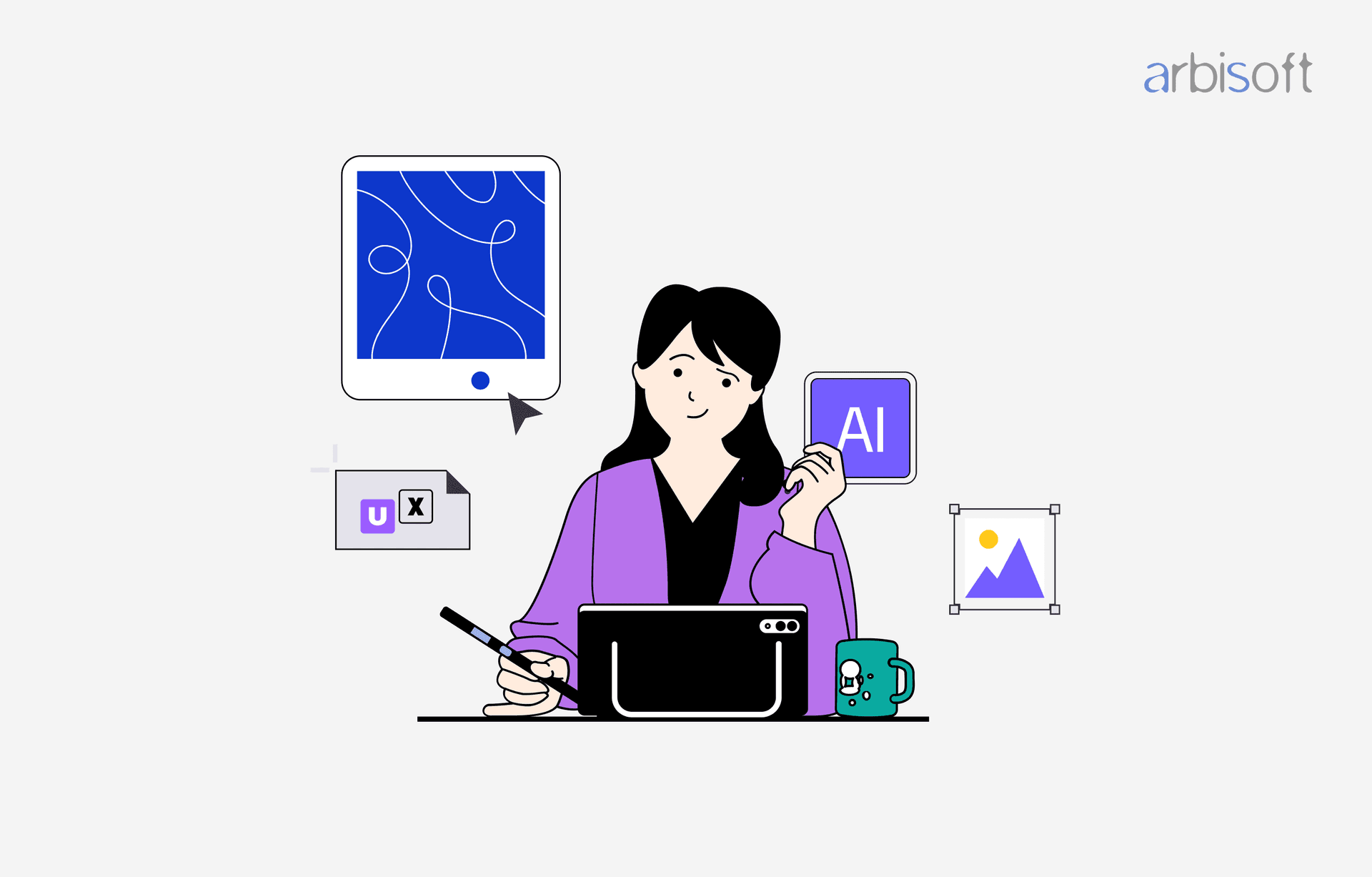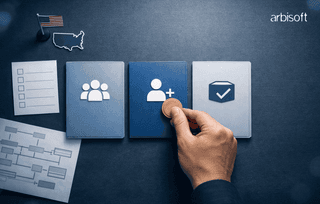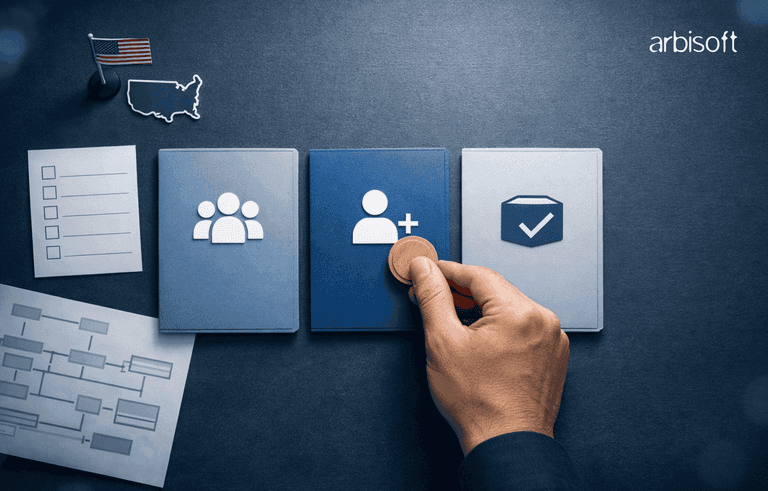We put excellence, value and quality above all - and it shows




A Technology Partnership That Goes Beyond Code

“Arbisoft has been my most trusted technology partner for now over 15 years. Arbisoft has very unique methods of recruiting and training, and the results demonstrate that. They have great teams, great positive attitudes and great communication.”
Preparing for an AI Design Future in B2B

Whether you're a creative director or a graphic designer, you might be considering adding artificial intelligence to your team. From creating AI artwork to brainstorming with ChatGPT, a new wave of design is emerging. Is AI just a helpful tool, or should we be cautious?
This raises important questions. How can we use AI ethically and avoid discrimination and bias? What's the best way to integrate these tools into our daily projects? And what about our jobs—will AI take over?
At Arbisoft, we believe that with this new technology, designers' skills will become more valuable than ever.
With this evolution in mind, businesses are increasingly turning to AI-driven design as a key trend. This blog explores what AI design is, how businesses can benefit from it, the opportunities it presents, and the potential pitfalls.
What is AI Design?
AI design uses artificial intelligence technologies to make the design process better, faster, and more creative. This means AI can help create new design ideas, handle repetitive tasks, predict what designs will be popular, and tailor user experiences to individual preferences. Here are some key benefits of integrating AI into design:
1. Improving User Interfaces (UI)
AI can help improve UI design by analyzing how users interact with a design and suggesting changes. Sketch2React converts design sketches into responsive code, making it easier for designers and developers to work together.
2. Predicting Design Trends
AI can look at current design trends and predict what will be popular in the future. WGSN (World Global Style Network) is a trend forecasting company that uses AI to predict design trends..
3. Generating Design Ideas
AI can analyze huge amounts of data to come up with fresh design ideas. For example, DeepArt turns photos into artwork inspired by famous painters' styles, and Artisto applies artistic filters to photos and videos using AI.
4. Personalizing User Experiences
AI can personalize designs based on user data. Canva's Magic Resize automatically adjusts designs to fit different dimensions, and their partnership with Runway ML introduces advanced AI video generation tools. Autodesk’s Dreamcatcher creates custom designs based on specific needs and goals, using AI to explore numerous possibilities quickly .
5. Automating Repetitive Tasks
AI can take over boring, repetitive tasks so designers can focus on being creative. Adobe Sensei helps with tasks like improving image quality, filling in missing parts of images and tagging content automatically.
6. Enhancing Creativity
AI tools like Runway ML provide various models for creative projects, like video editing and generating images from text, which can inspire new directions in design without needing to code.
Using these AI tools makes the design process more efficient and innovative, allowing designers to spend more time being creative and less time on manual tasks. AI design is changing how designers work, making it easier to create personalized, trendy, and high-quality designs.
Noah Levin is the VP of Product Design at Figma, where he leads the UX team, which includes design, writing, and research. Noah believes that AI will enhance the work of creators with different skill sets. In his recent talk at Figma Config, he discussed how AI can make both designers and non-designers more effective in their work.
“I think AI will both raise the ceiling—unleashing new heights, more creative outputs, more amazing products—and also lower the floor, making it easier to design and allowing anyone to collaborate visually.”
Noah Levin, VP of Product Design at Figma
Noah shares two key ideas to understand AI’s potential impact on the design industry:
- Design entails problem-solving for people rather than just simply pushing pixels.
- Design has always evolved with technology, and AI is not the first major shift to impact design.
Noah’s main advice is to stay intentional in your work, even as AI takes on more tasks. It's important to adapt and learn alongside technological advancements. He encourages everyone to be curious and optimistic about these changes so we can learn to use them to our advantage.
How Businesses Can Benefit from AI-Driven Design
Making use of AI-driven design isn't just about enhancing creativity, it's a strategic advantage that empowers businesses to achieve greater efficiency, creativity, and customer satisfaction.
- Accessibility Improvements: AI can help create more accessible designs by automatically checking for and correcting accessibility issues, such as ensuring color contrast and font sizes are appropriate for all users, including those with disabilities.
- Increased Efficiency: AI can automate routine design tasks, allowing designers to focus on more complex and creative aspects of their work. For example, AI tools can quickly generate multiple design variations, speeding up the iteration process.
- Enhanced Creativity: AI can provide designers with new ideas and perspectives that they might not have considered. Tools like DeepArt and Runway ML use AI to generate unique and innovative design concepts.
- Data-Driven Design: AI can analyze user data to understand preferences and behaviors, enabling designers to create more personalized and user-centric designs, further empowered by our business intelligence solutions for actionable insights.
- Cost Reduction: By automating repetitive tasks and speeding up the design process, AI can help businesses save on labor costs and reduce time-to-market for new products and services.
- Consistency and Branding: AI ensures consistency in design elements, which is crucial for maintaining a cohesive brand identity. AI tools can apply brand guidelines automatically across various design projects, ensuring that all materials align with the company’s branding standards.
- Rapid Prototyping: AI tools can facilitate rapid prototyping by quickly generating and testing multiple design iterations. This accelerates the development process and allows businesses to bring products to market faster.
Opportunities That AI Design Presents in Terms of Business
1. Personalization
AI can make user experiences much more personalized by analyzing data and predicting what customers like. For instance, Nike uses an AI tool called Nike Fit. This tool measures customers' feet accurately using computer vision and machine learning to recommend the perfect shoe size. This kind of personalization helps customers find the right products more easily, which can increase their loyalty and make them more likely to buy again
2. Innovation
AI brings new possibilities for innovation in design, helping businesses stay ahead of the competition. For example, Nike uses AI to enhance their shoe-fitting process, which not only improves customer satisfaction but also sets a new standard in the retail industry. This shows how AI can lead to the creation of unique and advanced products that stand out in the market.
3. Scalability
AI helps businesses scale their design efforts more efficiently. With AI tools, companies can handle more design work without lowering the quality. This is important for growing businesses that need to maintain high standards while expanding. AI can automate repetitive design tasks, allowing human designers to focus on more complex and creative work.
4. Real-Time Adjustments
AI can provide real-time feedback and make adjustments to ensure designs are always optimized for the best user experience. This is especially useful in fast-changing environments where user needs and preferences can shift quickly. For instance, AI platforms can analyze user interactions as they happen and suggest design tweaks to improve engagement and satisfaction right away.
By using AI in design, businesses can offer personalized experiences, foster innovation, scale their efforts effectively, and make real-time improvements. This helps them stay competitive and meet customer needs efficiently.
When used effectively, AI can be a powerful tool to enhance creativity. So, how should you view AI today, while it’s still developing? Let's hear from Arbiosft experts.
Abdul Dayan, Senior Product Designer at Arbisoft, shares his perspective on AI in design:
"I believe AI has the potential to play a significant role in the future of design, provided it is used effectively. While I remain cautious about its impact, I see AI as a valuable tool that can assist designers in the early stages of a project. It can provide quick insights from discovery documents, help define the user base, and generate initial visuals. However, the designer's expertise remains essential for tasks beyond these initial stages. AI could be particularly advantageous for managing repetitive tasks, speeding up the overall process.”
Are you making the most of AI in design?
Check out these top 10 free AI-design tools that will take your designs to the next level!

Discover some free AI-design tools that will level up your designs without costing you an arm and a leg!
Download the list!

Pitfalls to Watch Out For
Did you know that the Generative AI in Design Market was valued at USD 454.1 million in 2023? It is expected to soar to USD 7.89 billion by 2033, growing at a remarkable compound annual growth rate of 34% during the forecast period from 2024 to 2033. This impressive growth is fueled by the increasing demand for advanced technologies and the expanding engineering sector.
Despite its potential, there are several pitfalls to be aware of:
- Lack of Human Creativity: AI-made designs can sometimes miss the human touch and the emotions that human designers bring. This can make the designs feel cold or too mechanical.
- Risk of Overcomplicating: There is a danger of making things too complicated with AI by focusing too much on complex algorithms and not enough on what the design actually needs. This can lead to inefficiencies and designs that don't meet user needs.
- Too Much Dependence on AI: While AI can greatly improve the design process, relying too much on it can limit human creativity and intuition. It's important to balance AI insights with human creativity and expertise.
- Privacy Concerns: AI-driven design uses a lot of user data, which can raise privacy issues. Businesses must ensure they follow data protection laws and are clear with users about how their data is used.
- Bias in AI: AI systems can pick up biases from the data they are trained on. This can result in biased designs that don't fairly represent all users. It's important to regularly check AI systems for bias and use diverse data sets.
- Scaling Problems: Making AI-driven design work on large projects or across big companies can be challenging. It's important to make sure AI systems can handle bigger workloads efficiently.
- High Initial Costs: Starting with AI-driven design tools can be expensive in terms of both time and money. Businesses need to consider these costs against the possible long-term benefits.
Arbisoft UI, Product, and Design Services
Did you know that Arbisoft has a design lab named Nurture? Nurture helps early and mid-stage startups identify user needs and collaborate with them on product design. Nurture’s dedicated team works closely with startups to understand their vision and transform it into compelling, user-centric products. By combining our expertise in AI and design, Nurture empowers startups to bring their ideas to life and achieve their business objectives.
At Arbisoft, we specialize in leveraging AI to enhance our UI, product, and design services. Our team of expert designers and AI specialists work together to create innovative, efficient, and personalized design solutions for our clients. By integrating AI tools like Relume, ChatGPT, Midjourney, Mokker, Galileo AI, and more, we ensure that our design processes are at the forefront of technology, providing our clients with cutting-edge solutions that meet their unique needs.
Whether you need a complete product overhaul or just want to incorporate AI into your existing design processes, Arbisoft can help. Our tailored approach ensures that we deliver solutions that are not only innovative but also practical and aligned with your business goals.
Conclusion
AI is set to transform the B2B design landscape, offering numerous benefits such as increased efficiency, enhanced creativity, and data-driven insights. However, businesses must be mindful of the potential pitfalls and ensure a balanced approach that leverages both AI and human expertise.
Arbisoft's UI, Product, and Design services, along with specialized software development services, are designed to help you navigate this AI-driven future. By partnering with us, you can ensure that your business stays ahead of the curve, delivering innovative and personalized design solutions that drive success.
























